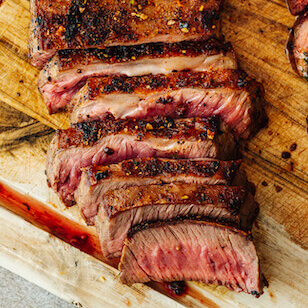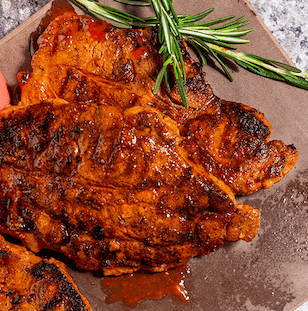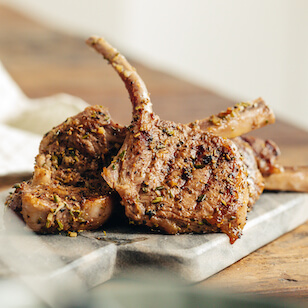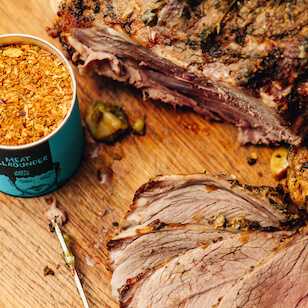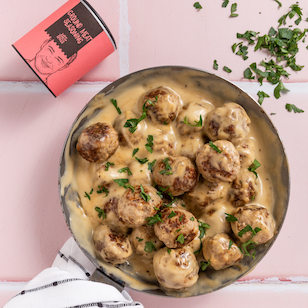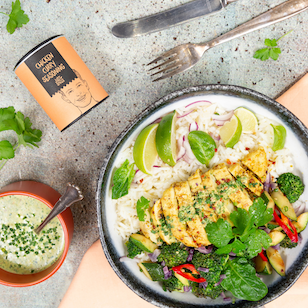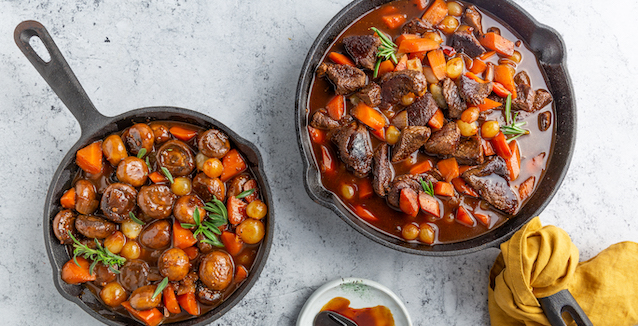
Seasoning Basics
How to properly season meat
February 16, 2022
Whether you’re cooking with beef, pork, lamb or chicken, the choice of spices and herbs plays a crucial role in unlocking the meat’s full potential. However, the vast array of flavour options can seem intimidating if you’re new to cooking. So, how do you choose the right seasoning for each type of meat? When is the meat adequately salted? And what’s the science behind a successful marinade? Allow us to guide you through the art of seasoning meat, addressing these questions and more.
Pairing the right spices with different meats
Understanding which spices complement each type of meat is key to elevating your dishes. Let’s take a look in more detail at different meats and how best to bring out their flavour with seasoning.
How to properly season beef
Beef boasts a robust and distinctive flavour profile, characterised by its predominant saltiness, umami notes and subtle hints of sweetness and acidity. To do justice to these flavours rather than overpowering them, a delicate hand is needed when seasoning beef. Opt for fine sea salt and freshly ground black pepper, which will enhance its natural nuances. Mediterranean herbs such as thyme, oregano and rosemary are excellent choices for beef, as they harmonise perfectly with its character. And if you’re feeling adventurous, consider spicing things up further with chilli, horseradish, mustard or garlic to introduce a touch of intensity, as beef pairs beautifully with these stronger flavours. Mustard has the added bonus of tenderising the beef if added before cooking, softening the meat.
- Pro tip! The next time you’re seasoning beef, give our Meat Allrounder a try. It’s designed to perfectly complement the rich and unique flavours of beef, containing paprika, garlic, mustard and tomato, among many other herbs and spices.
Best spice blends for beef
How to properly season pork
When it comes to seasoning pork like a pro, it’s essential to understand that pork has a milder saltiness and a touch of natural sweetness compared to beef. Whether you’re grilling or frying, pork boasts delicate foresty undertones waiting to be accentuated. Infuse your pork joint with the earthy warmth of cumin, the fruity subtlety of paprika or the charm of rustic herbs like rosemary and thyme. Elevate the heartiness of the meat with bold black pepper and robust garlic, and serve with rich stewed onions.
- Pro tip! For exceptional results, try our Meat & Roast Seasoning when seasoning pork – it’s a match made in culinary heaven.
Best spice blends for pork
How to properly season lamb
Lamb has a distinct and slightly tangy flavour that can stand up to robust spices. This meat pairs wonderfully with herby aromas, especially the timeless trio of rosemary, sage and mint.
Lamb’s versatility also shines in Asian cuisine, where it harmonises beautifully with fragrant herbs and spices like cinnamon, coriander and cumin. Alternatively, a simple application of our versatile Meat Allrounder will work wonders, as it gives you fantastic flavour all from one pot. For an extraordinary taste adventure, braise lamb with dried apricots, raisins or prunes, and serve it alongside rice or couscous. The combination of savoury and sweet flavours will transport your taste buds to a whole new realm of culinary delight.
Best spice blends for lamb
How to properly season chicken
Chicken, known for its relatively mild flavour, offers a blank canvas for seasoning, allowing you to unleash your creativity. Embrace robust and flavourful ingredients, and don’t be afraid to experiment! To give your chicken a tantalising Asian twist, consider using ingredients like curry, lemongrass and coriander, which make great Thai chicken dishes. For a kick of heat, fiery chilli or aromatic ginger can provide the necessary spiciness. Back to European cuisine, sage works wonders in enhancing the hearty flavours of all poultry, making it an excellent choice for many dishes, and particularly for goose meat. Additionally, the timeless combination of citrus fruits and poultry transcends culinary borders worldwide – think lemon chicken and duck à l’orange.
But if all this feels overwhelming, we have the perfect solution for you. To create a top-notch chicken dish, look no further than our specially crafted Chicken Seasoning. Simply marinate the breast or leg (or whole bird!) with a spoonful or two mixed with a good-quality olive oil. Roast, fry or grill, and you’ve got the simplest chicken dish that will sing with flavour.
Best spice blends for chicken
When to salt the meat
We’ve talked a lot about different flavour pairings with different meats. But we also need to address the important question of whether to salt meat before or after cooking. This is hotly debated on many forums, but we can confidently say that you should salt your meat before you cook it!
Seasoning your meat with salt before cooking allows the salt to penetrate evenly throughout the meat, rendering it more tender and juicy. When you salt your meat at least a couple of hours ahead of cooking, the juices that come to the surface have time to be reabsorbed into the meat. A small amount of salt added in advance has a more profound impact on both flavour and texture than salting right before serving, which can end up simply tasting salty, rather than seasoned.
- Pro tip! Opt for fine salt crystals, such as our Rock Salt or simple table salt, for seasoning meat before cooking. Save your beautiful pyramid salt and fleur de sel for finishing your dishes and adding a delicate crunch right before serving.


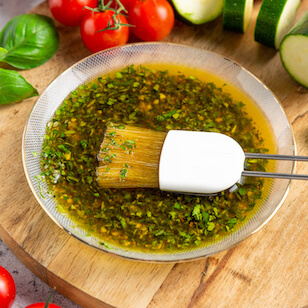

Reasons to marinate your meat
Regardless of whether you’re making a beef, pork, lamb or chicken dish, marinating is a simple yet highly effective technique to infuse your meat with delicious flavours and help make the meat more tender and juicy. The beauty of marinades lies in their versatility, offering lots of different flavour profiles for the same cut of meat.
Dry marinades, also known as dry rubs, contain no liquid, as the name suggests. They are a mix of herbs, spices and salt. You simply sprinkle your seasoning all over the meat and chill for at least an hour to allow the flavours to penetrate the meat. Liquid marinades typically feature a blend of oil, acid, salt and then your choice of herbs and spices. Mix your chosen marinade ingredients together in a large bowl and place your meat carefully into the liquid, making sure that everything is covered. Chill and let the marinade work its magic. You can either discard the leftover marinade or bring it to the boil in a saucepan to become the base of a beautiful sauce. Don’t eat it raw!
Spice blends and mixes from Just Spices can easily be used as either dry rubs or in liquid marinades – check out our recipe world for more inspiration on how to use our spices correctly.
Flavour: The marinade’s aromatic ingredients, such as herbs and spices, can permeate the meat’s surface and, to some extent, penetrate its interior. As the meat absorbs these flavours, it becomes more delicious.
Tenderisation: Many marinades contain an acid like vinegar, citrus juice or yoghurt. These acids break down the meat’s proteins, making the meat more tender and moist.
Moisture retention: The marinade’s liquid components, often including oils, help seal moisture within the meat. This prevents the meat from drying out during cooking and creates a juicier, more succulent dish.
Balancing flavours: Marinating allows you to balance the natural taste of the meat with complementary flavours. The acid in the marinade can also counteract the meat’s natural sweetness or saltiness, creating a harmonious blend of tastes.
As you can see, marinating meat is not just an art, it’s a science! And one that results in more delicious, tender and succulent meat. So, the next time you marinate, know that you’re not just adding flavour – you’re conducting a culinary experiment to elevate your meat to new heights of taste and texture.


Want to know more about cooking meat?
Do you want to learn more about cooking meat on the barbecue? Check out our article on how to make your next barbecue a huge success.





